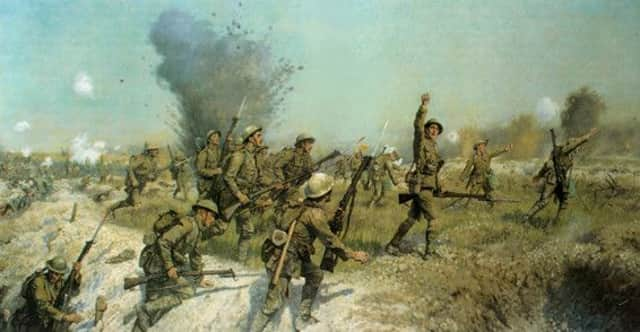The sad roll call - aftermath of battle


Lt. Col. Bull records that the battalion were relieved by the South Wales Borderers.
His war diary entry is only a few words but I feel it encapsulates the traumatic effect which the slaughter of 1st July must have caused up and down the British lines.
Advertisement
Hide AdAdvertisement
Hide AdWhile the newspapers of the time lauded a victory and described casualties as light (so did a misinformed Haig), Bull’s statement makes no bones about the tragedy which had befallen his beloved battalion.


He wrote: “Remains of batt. Proceeded to billets at Martinsart. 126 strong.”
We’ve already seen how only 46 men were still available to meet any German counter-attack on July 1. Thus the ‘remains of battalion’ consist of these few fit men and those who had been ‘left out of battle’ – they were to form a core around which the new battalion would be built.
After a fitful rest at Martinsart, the Central Antrims pulled on their boots and set off on another march, this to time to Forceville. There in ‘fine weather’ those who were left from 108th Brigade were addressed by the Divisional Commander, Major Gen. O.S. W. Nugent.
Advertisement
Hide AdAdvertisement
Hide AdOliver Nugent was a thorough professional and waxing lyrical was not his forte in life.


His words to the Division rankled with a sizeable number of the soldiers who paraded for the occasion.
One man commented: “General Nugent said the Division had done well but could have done better. A few of us thought he was anything but a gentleman.”
This view is understandable in light of the Division’s success south of the Ancre where they had stormed the Schwaben Redoubt and penetrated to the ridge above Grandcourt – the furthest advance by a major formation on that bloody day.
Advertisement
Hide AdAdvertisement
Hide AdBut if Nugent was sparse in his praise, the answer may lie in his commitment to managing a ‘political division’ in the most professional fashion.


They had been labelled, somewhat derisively in many cases, as ‘Carson’s Army but Nugent was determined to forge the Ulstermen into a first class Division of British soldiers. On the other side of the coin, the press across Britain went to the other extreme, heaping their prose with praise of the Division.
In the meantime, the men of the 12th Rifles simply packed up their troubles and got on with army life.
On July 5, the Bn. tramped on to Puchevillers and for the next four days, the depleted companies were re-organised. A Church parade was held on July 9. Bull consistently remarks on the weather in the diary and throughout this period he categorises the conditions as ‘beautiful’.
Advertisement
Hide AdAdvertisement
Hide AdOn 10 July, the CAVs marched to new billets at Gazencourt where they stayed for one night before marching on through Doullens and on to Frevent where the Bn. entrained in the late afternoon for Steenbeck in Flanders. On arrival at 8.30pm, the men marched on to Lynde, finally reaching their billets at 11.30pm.


The Twelfth
The next morning, Bull records that ‘12th was celebrated with all due formality at Lynde’.
This was in stark contrast to the situation in Ulster where parades were cancelled and the province ‘came to a halt’ for five minutes. By this time the extent of the casualties in the Ulster Division and other units in which men from the old province were serving had begun to come through.
Newspaper columns were filled with pictures of dead and wounded soldiers. An air of gloom, undoubtedly tinged with a modicum of patriotic pride, had descended on Ulster.
Advertisement
Hide AdAdvertisement
Hide AdEven a casual glance through the obituaries of the men from Co. Antrim who died on 1st July will reveal that a sizeable number had ‘Orange’ connections. That ‘Twelfth’ in Lynde must have been a poigant ceremony indeed.
There is a military maxim which decrees that men who have faced the horrors of battle cannot be allowed to dwell on their experiences.
Lt. Col. Bull obviously subscribed to this theory and, on July 13, the Bn. were back on the match again, this time through St. Omer to Houlle, where the men found ‘very comfortable billets’ .